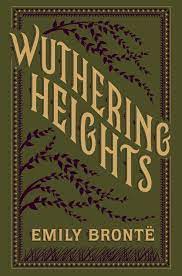Wuthering Heights Page #31
Wuthering Heights is an 1847 novel by Emily Brontë, initially published under the pseudonym Ellis Bell. It concerns two families of the landed gentry living on the West Yorkshire moors, the Earnshaws and the Lintons, and their turbulent relationships with Earnshaw's adopted son, Heathcliff.
The next time Heathcliff came my young lady chanced to be feeding some pigeons in the court. She had never spoken a word to her sister-in-law for three days; but she had likewise dropped her fretful complaining, and we found it a great comfort. Heathcliff had not the habit of bestowing a single unnecessary civility on Miss Linton, I knew. Now, as soon as he beheld her, his first precaution was to take a sweeping survey of the house-front. I was standing by the kitchen-window, but I drew out of sight. He then stepped across the pavement to her, and said something: she seemed embarrassed, and desirous of getting away; to prevent it, he laid his hand on her arm. She averted her face: he apparently put some question which she had no mind to answer. There was another rapid glance at the house, and supposing himself unseen, the scoundrel had the impudence to embrace her. “Judas! Traitor!” I ejaculated. “You are a hypocrite, too, are you? A deliberate deceiver.” “Who is, Nelly?” said Catherine’s voice at my elbow: I had been over-intent on watching the pair outside to mark her entrance. “Your worthless friend!” I answered, warmly: “the sneaking rascal yonder. Ah, he has caught a glimpse of us—he is coming in! I wonder will he have the heart to find a plausible excuse for making love to Miss, when he told you he hated her?” Mrs. Linton saw Isabella tear herself free, and run into the garden; and a minute after, Heathcliff opened the door. I couldn’t withhold giving some loose to my indignation; but Catherine angrily insisted on silence, and threatened to order me out of the kitchen, if I dared to be so presumptuous as to put in my insolent tongue. “To hear you, people might think you were the mistress!” she cried. “You want setting down in your right place! Heathcliff, what are you about, raising this stir? I said you must let Isabella alone!—I beg you will, unless you are tired of being received here, and wish Linton to draw the bolts against you!” “God forbid that he should try!” answered the black villain. I detested him just then. “God keep him meek and patient! Every day I grow madder after sending him to heaven!” “Hush!” said Catherine, shutting the inner door. “Don’t vex me. Why have you disregarded my request? Did she come across you on purpose?” “What is it to you?” he growled. “I have a right to kiss her, if she chooses; and you have no right to object. I am not your husband: you needn’t be jealous of me!” “I’m not jealous of you,” replied the mistress; “I’m jealous for you. Clear your face: you sha’n’t scowl at me! If you like Isabella, you shall marry her. But do you like her? Tell the truth, Heathcliff! There, you won’t answer. I’m certain you don’t.” “And would Mr. Linton approve of his sister marrying that man?” I inquired. “Mr. Linton should approve,” returned my lady, decisively. “He might spare himself the trouble,” said Heathcliff: “I could do as well without his approbation. And as to you, Catherine, I have a mind to speak a few words now, while we are at it. I want you to be aware that I know you have treated me infernally—infernally! Do you hear? And if you flatter yourself that I don’t perceive it, you are a fool; and if you think I can be consoled by sweet words, you are an idiot: and if you fancy I’ll suffer unrevenged, I’ll convince you of the contrary, in a very little while! Meantime, thank you for telling me your sister-in-law’s secret: I swear I’ll make the most of it. And stand you aside!” “What new phase of his character is this?” exclaimed Mrs. Linton, in amazement. “I’ve treated you infernally—and you’ll take your revenge! How will you take it, ungrateful brute? How have I treated you infernally?” “I seek no revenge on you,” replied Heathcliff, less vehemently. “That’s not the plan. The tyrant grinds down his slaves and they don’t turn against him; they crush those beneath them. You are welcome to torture me to death for your amusement, only allow me to amuse myself a little in the same style, and refrain from insult as much as you are able. Having levelled my palace, don’t erect a hovel and complacently admire your own charity in giving me that for a home. If I imagined you really wished me to marry Isabel, I’d cut my throat!” “Oh, the evil is that I am not jealous, is it?” cried Catherine. “Well, I won’t repeat my offer of a wife: it is as bad as offering Satan a lost soul. Your bliss lies, like his, in inflicting misery. You prove it. Edgar is restored from the ill-temper he gave way to at your coming; I begin to be secure and tranquil; and you, restless to know us at peace, appear resolved on exciting a quarrel. Quarrel with Edgar, if you please, Heathcliff, and deceive his sister: you’ll hit on exactly the most efficient method of revenging yourself on me.” The conversation ceased. Mrs. Linton sat down by the fire, flushed and gloomy. The spirit which served her was growing intractable: she could neither lay nor control it. He stood on the hearth with folded arms, brooding on his evil thoughts; and in this position I left them to seek the master, who was wondering what kept Catherine below so long. “Ellen,” said he, when I entered, “have you seen your mistress?” “Yes; she’s in the kitchen, sir,” I answered. “She’s sadly put out by Mr. Heathcliff’s behaviour: and, indeed, I do think it’s time to arrange his visits on another footing. There’s harm in being too soft, and now it’s come to this—.” And I related the scene in the court, and, as near as I dared, the whole subsequent dispute. I fancied it could not be very prejudicial to Mrs. Linton; unless she made it so afterwards, by assuming the defensive for her guest. Edgar Linton had difficulty in hearing me to the close. His first words revealed that he did not clear his wife of blame. “This is insufferable!” he exclaimed. “It is disgraceful that she should own him for a friend, and force his company on me! Call me two men out of the hall, Ellen. Catherine shall linger no longer to argue with the low ruffian—I have humoured her enough.” He descended, and bidding the servants wait in the passage, went, followed by me, to the kitchen. Its occupants had recommenced their angry discussion: Mrs. Linton, at least, was scolding with renewed vigour; Heathcliff had moved to the window, and hung his head, somewhat cowed by her violent rating apparently. He saw the master first, and made a hasty motion that she should be silent; which she obeyed, abruptly, on discovering the reason of his intimation. “How is this?” said Linton, addressing her; “what notion of propriety must you have to remain here, after the language which has been held to you by that blackguard? I suppose, because it is his ordinary talk you think nothing of it: you are habituated to his baseness, and, perhaps, imagine I can get used to it too!” “Have you been listening at the door, Edgar?” asked the mistress, in a tone particularly calculated to provoke her husband, implying both carelessness and contempt of his irritation. Heathcliff, who had raised his eyes at the former speech, gave a sneering laugh at the latter; on purpose, it seemed, to draw Mr. Linton’s attention to him. He succeeded; but Edgar did not mean to entertain him with any high flights of passion.
Translation
Translate and read this book in other languages:
Select another language:
- - Select -
- 简体中文 (Chinese - Simplified)
- 繁體中文 (Chinese - Traditional)
- Español (Spanish)
- Esperanto (Esperanto)
- 日本語 (Japanese)
- Português (Portuguese)
- Deutsch (German)
- العربية (Arabic)
- Français (French)
- Русский (Russian)
- ಕನ್ನಡ (Kannada)
- 한국어 (Korean)
- עברית (Hebrew)
- Gaeilge (Irish)
- Українська (Ukrainian)
- اردو (Urdu)
- Magyar (Hungarian)
- मानक हिन्दी (Hindi)
- Indonesia (Indonesian)
- Italiano (Italian)
- தமிழ் (Tamil)
- Türkçe (Turkish)
- తెలుగు (Telugu)
- ภาษาไทย (Thai)
- Tiếng Việt (Vietnamese)
- Čeština (Czech)
- Polski (Polish)
- Bahasa Indonesia (Indonesian)
- Românește (Romanian)
- Nederlands (Dutch)
- Ελληνικά (Greek)
- Latinum (Latin)
- Svenska (Swedish)
- Dansk (Danish)
- Suomi (Finnish)
- فارسی (Persian)
- ייִדיש (Yiddish)
- հայերեն (Armenian)
- Norsk (Norwegian)
- English (English)
Citation
Use the citation below to add this book to your bibliography:
Style:MLAChicagoAPA
"Wuthering Heights Books." Literature.com. STANDS4 LLC, 2024. Web. 29 Nov. 2024. <https://www.literature.com/book/wuthering_heights_1627>.




Discuss this Wuthering Heights book with the community:
Report Comment
We're doing our best to make sure our content is useful, accurate and safe.
If by any chance you spot an inappropriate comment while navigating through our website please use this form to let us know, and we'll take care of it shortly.
Attachment
You need to be logged in to favorite.
Log In